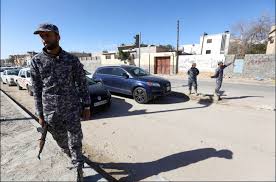EURASIA Review
By Magharebia
The threat of terrorism is at an unprecedented level in the Maghreb and unless immediate action is taken, it will only get worse.
This is the prognosis from many Tunisian experts, including Bassel Torjman, an expert in Maghreb affairs and specialist in Islamic movements.
“The shift in terrorist groups’ strategy, from establishing areas of influence and control to launching operations through individuals or small groups in big cities, is causing security confusion and collective fears that would give these groups a chance to proceed with their project on the ground,” he told Magharebia.
The entire Sahel-Saharan region faces the same threat from terrorism and transnational crime, noted political analyst Habib Souid.
“I don’t think that any Maghreb country can claim to be capable of confronting these issues alone, given the merger that is taking place between terrorist groups in the region,” he said.
Maghreb countries, meanwhile, have only been “dreaming about their unity for decades”, he pointed out.
This issue of co-operation to stem the terror threat hits home for Tunisia’s Habib Ben Yahia, the head of the Arab Maghreb Union (UMA).
The “fastest way to deal with the complex challenges facing our country…is through co-ordination”, he told Maghreb foreign ministers last May in Rabat.
For political analyst Noureddine Mbarki, the biggest of the challenges are terrorism and radical groups.
Libya has “become a destination for jihadis from various nationalities” the Islamic State (ISIS) project “is based on expansion and ‘removal of borders’” and al-Qaeda in the Islamic Maghreb (AQIM) and ISIS are engaged in a fierce rivalry. These issues make the crisis even more urgent, he said.
“This threat and challenge are extraordinary,” Mbarki said, noting that the solution was “regional co-ordination among security and intelligence services”.
“Trafficking should be dealt with today as part of the file of terrorism, rather than an isolated file, now that we have become sure that the ‘economy’ of these groups is based on trafficking,” he added.
In her turn, Samira Kadoura, a specialist on criminal cases, called for setting up a “Maghreb police” body, to share information among national security agencies.
“Libya has turned into a base for training and a starting point for all terrorist groups, drugs and arms traffickers,” the analyst said.
“The urgent matter is to draw up a joint plan for managing the consequences of the Libyan crisis on the entire region,” she added.







